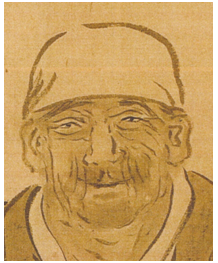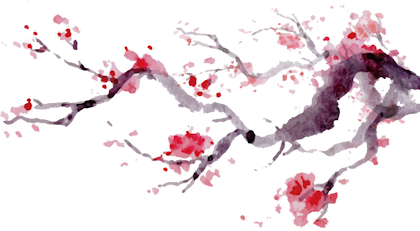Basho's thoughts on...
Matsuo Basho 1644~1694

The only substantial
collection in English
of Basho's renku, tanka,
letters and spoken word
along with his haiku, travel
journals, and essays.
The only poet in old-time
literature who paid attention with praise
to ordinary women, children, and teenagers
in hundreds of poems
Hundreds upon hundreds of Basho works
(mostly renku)about women, children,
teenagers, friendship, compassion, love.
These are resources we can use to better
understand ourselves and humanity.
Interesting and heartfelt
(not scholarly and boring)
for anyone concerned with
humanity.
“An astonishing range of
social subject matter and
compassionate intuition”
"The primordial power
of the feminine emanating
from Basho's poetry"
Hopeful, life-affirming
messages from one of
the greatest minds ever.
Through his letters,
we travel through his mind
and discover Basho's
gentleness and humanity.
I plead for your help in
finding a person or group
to take over my 3000 pages of Basho material,
to edit and improve the material, to receive 100%
of royalties, to spread Basho’s wisdom worldwide
and preserve for future generations.
Quotations from Basho Prose
The days and months are
guests passing through eternity.
The years that go by
also are travelers.
The mountains in silence
nurture the spirit;
the water with movement
calms the emotions.
All the more joyful,
all the more caring
Seek not the traces
of the ancients;
seek rather the
places they sought.
basho4humanity
@gmail.com
Plea for Affiliation
Plea For Affiliation
I pray for your help
in finding someone
- individual, university,
or foundation -
to take over my
3000 pages of material,
to cooperate with me
to edit the material,
to receive all royalties
from sales, to spread
Basho’s wisdom worldwide,
and preserve for
future generations.
basho4humanity
@gmail.com
Home >
Topics >
Praise for Women
Ancient Greek literature praises Penelope and Antigone, Shakespeare praises Juliet, Rosalind, and Emilia, but Basho praises the ordinary woman living her everyday life in more than 200 poems. I believe he learned the nature of female life and consciousness from watching his mother and four sisters.
Basho’s Appreciation for Women
“Basho shows an appreciation for women far beyond what we have been led to expect from a Japanese man of this era” said Bronagh, my research assistant from Ireland.
...
B-01
Woman with Goddess
Basho worships the divine female in nature:
As I speak the tree spirits echoin spring breeze
Form of mountain goddess disperses in the rapids.
Another poet ...
B-02
Mothers
Giving birth to
love in the world, she
adorns herself.
Basho sees a woman make herself beautiful while she gives birth. Women affirming life:
To quie ...
B-03
Brides, Wives, Widows
Ordinary women hopeful or disappointed, women at work, washing hair, with their peers chatting or complaining, women neglected or abandoned, widows living alone with memories. Basho never ...
B-04
Pregnancy to Birth
Yes, Basho did write about such feminine topics: in this haiku, non-human birth while in many renku he explores human birth.
Buddha’s Birthday on this day is born a b ...
B-05
Breastfeeding with Basho
Ten poems on breastfeeding written 320 to 350 years ago by the Japanese male poet Basho are a vital legacy to inspire women breastfeeding today and envigorate the breastfeeding movement. M ...
B-06
Women at Work
Wrapping rice cake/with one hand she tucks/hair behind ear.
粽 ゆう/片手にはさむ/額 髪
Chimaki yuu/kata-te ni hasamu/hitai-gami
‘Rice cake’ can be rice pounded into a paste then ...
B-07
The Sensual Female Basho
Rarely is Basho is abstract or philosophical; instead his usual focus is on the physical and sensory; in this article, we follow him exploring the contours of the fema ...
B-08
Rice Maidens
Rice, cultivated in Japan for 2000 years, grows over much flat land and extends on terraces into the hills. In Asian cultures, rice is strongly associated with women, fertility, and nurturing children ...
B-09
In the Mirror
A mirror was associated with the Sun-Goddess; being round and shiny, a “child of the sun”; the soul originally clear as a mirror; sins like dust easily wiped off to restore purity.
B ...
B-10
She Walks in Beauty
We meet the famous beauties of ancient China and Japan, and learn the tragic ends their beauty brought them. First, however, explore six Basho visions of the beauty of woman’s face and form.
Wi ...
B-11
Oppression of Women
Basho's renku, or linked verses, about the oppression of women in this article, as well as those empowering women in article B-13, reveal a feminism in Basho within his misogynistic society. ...
B-12
Empowering Women
Can women today be empowered by poems and prose written in a different language by a man 330~350 years ago in a patriarchal society? Basho never shows us women lifting heavy loads, fighting ...
B-13
Female Icons in Four Seasons
The 200 woman-centered poems by Basho are a priceless cultural legacy. Nowhere else in world literature written by men can we find so much praise for the life and consciousness of ordinary w ...
B-14
Six Renku Icons of the Feminine
Basho said that his followers wrote haiku equal to his, but could not reach the depths he discovered in renku. Here are six superb examples of those depths he found in women and girls. ...
B-15
Tanka Visions of Women
People who know Basho believe he wrote no tanka (poems in 31 sound-units) because they have never seen one in Japanese or translation, however two Basho tanka appear among works never translated ...
B-16
Supernatural Women
Two legends about women told by Hearn in his collection of supernatural tales Kwaidan may relate to particular Basho verses. The Legend of Uba-zakura, the Wet-Nurse’s Cherry Tree ...
B-17
Jutei:
Here we meet, obscurely, the mystery woman in Basho’s life. Who was she? Why did Basho care about her? So little evidence exists, yet all sorts of presumptuous theories have arisen. Each s ...
B-18
Murasaki to Basho
Come explore the Energy between the Tale of Genji - world’s first novel and until recently,the longest - and Basho more than five centuries later: men, women, and children interacti ...
B-19
Shonagon to Basho
One thousand years ago, two women in Kyoto – Murasaki Shikibu and Sei Shonagon – produced two of the greatest works of world literature, The Tale of Genji and the Pillow Book. In thi ...
B-20
Diving into Humanity
Here is a unusual bit of Basho renku which takes an intimate look into the life of Japanese women, and
leads to an understanding of how the human brain may have evolved. Kikaku wrote this passag ...
B-21
Mother Daughter Bond
Basho grew up watching his four sisters (one older and 3 younger) interact with their mother. Through these four Mother/Daughter poems by Basho, modern mothers and daughters can explo ...
B-22
Her Life-Breath:
It would be good for you to see from practice that your following stanza suits the previous one, as an expression of the same heart's connection.
Basho's stanza illustrates this:
...
B-23
Solidarity Between Women in Works of Basho
(Prototype of an article on Solidarity between Women in the works of Basho)
Uko, a woman married to a doctor, and Chigetsu, widow of a samarai official, were Basho followers living in sepa ...
B-24
Resources for Empowering Women and Girls
Giving birth tolove in the world, sheadorns herself
Basho actually wrote about makeup, dress, and hair, about female beauty and mirrors enabling such beauty,
about breastfeeding and little ...
B-25
Adoration:
One of the primal deities in Japanese mythology is the Well Goddess, Mizuha-nome-no-miko, who is
paired with Suijin, the male God of Water. The following tanka is anonymous, however Basho said
it was: ...
B-26
Feminism from Murasaki to Basho
In Chapter V of the early 12th century Tale of Genji, the young Shining Prince kidnaps nine-year-old Murasakito raise her in seclusion to become the love of his life when she matures. A ...
B-27
For the Women of India
The two great poets of Asia, Basho and Tagore, sing of the Goddess Lakshmi, mountain, daybreak, household fire, moon and starlight, motherhood, giving birth and blessing the newborn girl.
W ...
B-28
Mother: A Feminist Icon
Women created new life out of their bodies and sustained it by nursing and maternal care, connected to female kin or neighbors, sustained by female prayer and ritual. ...
B-29
Basho's thoughts on...
Matsuo Basho 1644~1694

The only substantial
collection in English
of Basho's renku, tanka,
letters and spoken word
along with his haiku, travel
journals, and essays.
The only poet in old-time
literature who paid attention with praise
to ordinary women, children, and teenagers
in hundreds of poems
Hundreds upon hundreds of Basho works
(mostly renku)about women, children,
teenagers, friendship, compassion, love.
These are resources we can use to better
understand ourselves and humanity.
Interesting and heartfelt
(not scholarly and boring)
for anyone concerned with
humanity.
“An astonishing range of
social subject matter and
compassionate intuition”
"The primordial power
of the feminine emanating
from Basho's poetry"
Hopeful, life-affirming
messages from one of
the greatest minds ever.
Through his letters,
we travel through his mind
and discover Basho's
gentleness and humanity.
I plead for your help in
finding a person or group
to take over my 3000 pages of Basho material,
to edit and improve the material, to receive 100%
of royalties, to spread Basho’s wisdom worldwide
and preserve for future generations.
Quotations from Basho Prose
The days and months are
guests passing through eternity.
The years that go by
also are travelers.
The mountains in silence
nurture the spirit;
the water with movement
calms the emotions.
All the more joyful,
all the more caring
Seek not the traces
of the ancients;
seek rather the
places they sought.
basho4humanity
@gmail.com
Plea for Affiliation
Plea For Affiliation
I pray for your help
in finding someone
- individual, university,
or foundation -
to take over my
3000 pages of material,
to cooperate with me
to edit the material,
to receive all royalties
from sales, to spread
Basho’s wisdom worldwide,
and preserve for
future generations.
basho4humanity
@gmail.com



